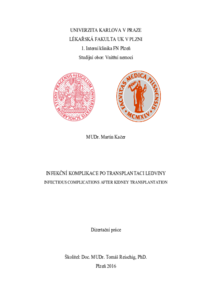Infekční komplikace po transplantaci ledviny
Infectious complications after kidney transplantation
dissertation thesis (DEFENDED)

View/
Permanent link
http://hdl.handle.net/20.500.11956/83872Identifiers
Study Information System: 139250
Collections
- Kvalifikační práce [332]
Author
Advisor
Referee
Pazdiora, Petr
Seeman, Tomáš
Faculty / Institute
Faculty of Medicine in Pilsen
Discipline
-
Department
Information is unavailable
Date of defense
16. 11. 2016
Publisher
Univerzita Karlova, Lékařská fakulta v PlzniLanguage
Czech
Grade
Pass
2 Abstrakt Infekční komplikace po transplantaci ledviny V obecné části této práce jsou stručně rekapitulována nejběžnější a charakteristická infekční onemocnění pacientů po transplantaci ledviny. Praktická část pak prezentuje výsledky vědecké práce zabývající se prevencí nejčastější infekce po renální transplantaci, cytomegalovirové infekce. Celosvětově patří infekce mezi hlavní příčiny morbidity příjemců orgánových transplantací a jsou druhou nejčastější příčinou mortality pacientů s funkčním ledvinným štepem. V prvním roce po transplantaci ledviny prodělá klinicky manifestní infekční komplikaci každý druhý příjemce a cca 20% pacientů je v prvních 12 měsících z důvodu infekce hospitalizováno. Cytomegalovirus (CMV) je nejčastější virovou infekcí pacientů po transplantaci ledviny a její výskyt je spojen se závažnými negativními důsledky pro osud štěpu i pacienta. Prevence CMV je klíčovou součástí péče o pacienty po transplantaci ledviny. Valganciklovir je vzhledem ke své účinnosti a dobré biologické dostupnosti nejčastěji užívaným antivirotikem v profylaxi CMV. Jedinou alternativou doporučenou pro prevenci CMV u pacientů po transplantaci ledviny je v současné době valacyklovir. Dosud však chyběla studie porovnávající proti sobě přímo valganciklovir a valacyklovir v univerzální profylaxi CMV u pacientů po...
3 Abstract Infectious complications after kidney transplantation In the general part of this work, the most common and typical infectious complications in renal transplant recipients are reviewed. The practical part presents results of our research on prevention of the most common infection in renal transplant recipients, cytomegalovirus infection. Globally, infection belongs amongst the main causes of morbidity of solid organ recipients and is the second leading cause of mortality in patients with a functioning kidney graft. In the first year post kidney transplant, approximately one half of recipients undergo a clinically apparent infectious complication and 20% of patients are hospitalized due to infection. Cytomegalovirus (CMV) is the most common viral infection in kidney transplant patients and its occurence is associated with serious negative consequences for both kidney and patient survival. Prevention of CMV is essential in renal transplant recipients. Valganciclovir, due to its efficacy and good bioavailability, is the most commonly used antiviral agent used in CMV prophylaxis. The only currently recommended alternative for the prevention of CMV in patients undergoing renal transplantation is valacyclovir. So far, studies comparing valacyclovir and valganciclovir for CMV prophylaxis in renal...
